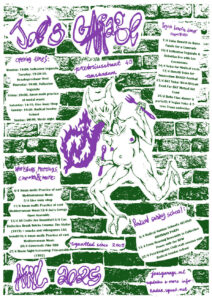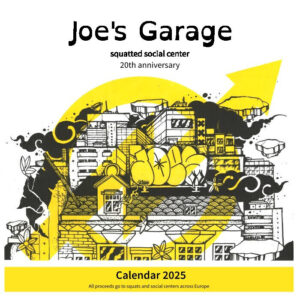Ma./Mo. 20 feb. 2012, Soweto benefiet, Volkseten Vegazulu, 19:00, no reservation, donations welcome SOWETO Creating solidaristic forms of collective social housing
 “Housing is a basic need for a dignified existence and is a human right. Providing for this need is not an individual, but a societal and thus collective responsibility, especially given that:
“Housing is a basic need for a dignified existence and is a human right. Providing for this need is not an individual, but a societal and thus collective responsibility, especially given that:
– in a just society the costs should be distributed on the basis of ability to pay, and the benefits based on need;
– such a society can only be brought about through a collective effort by all those involved;
– such an effort can only succeed if all those involved take full responsibility for this common goal, and for each other.”
Translation of Article 2.1 of the statutes of Woningbouwvereniging Soweto
W hat is Woningbouwvereniging Soweto?
Woningbouwvereniging Soweto is a housing association that was established in 2006 by a number of Amsterdam housing activists. The original catalyst for its creation was the attempt in 2006-7 to legalise Pretoriusstraat 28 in Amsterdam Oost. In a nutshell Soweto is an idealistic housing association which aims to be a legal and democratic
framework within which multiple solidarity based housing projects, such as legalized squats, can operate together simultaneously, thus increasingtheir political and economic strength.
Why Soweto?
Multiple factors led to the birth of Soweto. Firstly, a general disillusionment with the manner in which mainstream housing associations have betrayed their social founding principles, and the general shift in housing policy towards privatization. Secondly, the realisation that in the past many legalized squats have, after legalization, become economially and politically isolated from the housing struggle from which they emerged, and the desire to prevent this “drain” of political and economic capital. Thirdly, the desire to create a housing association based on DIY principles and grass-roots organisation.
Eight key principles of Soweto
1.Pro-renting. Creation of affordable, stable rental housing. Promotion of renting as desirable housing form;advantage of renting is the political and personal freedom that stems from low living costs, versus the dominant discourse of buying own house.
2.Soweto remains owner of the building. Users of building rent it from Soweto as group or groups (e.g. living groups, user groups, or combinations thereof), not as individual renters.
3.Strong preference for user/tenant groups with idealistic internal organisation. Promotion of communal forms of living (living groups). Preference for living groups that endorse the principles of Soweto. Preference for non-commercial/ idealistic public spaces.
4.Re-use of resources. Realized housing projects to be used to leverage more favourable financial terms when acquiring new buildings.
5.Re-use of acquired expertise. In this way skills that are learned during a legalisation or acquirement project, are not lost after completion of the project.
6.To enable and encourage a high-level of involvement from tenants/users of the houses. Strong involvement of users/tenants at all stages of the process, both during legalisation/acquisation and beyond. Keeping (building) costs low via DIY: “zelfwerkzaamheid”.
7.Political safeguards. Democratic association structure. Prospective renters/ tenants become members of Soweto. Political safeguards to prevent privatization: users/tenants of Soweto houses limited to 40% of the votes at annual general meetings to prevent “privatization coups”. Ambition to have many members that do not work/ live in the houses.
8.Multiple funding sources. Mortgages, gifts/low-interest loans from the community and other options.
PLEASE JOIN SOWETO, get involved and and help to make us stronger!
Email bestuur(a)soweto.nl



